江苏省徐州市王杰中学高一英语课件:Unit3 Words(牛津译林版必修3)
- 格式:ppt
- 大小:347.00 KB
- 文档页数:34
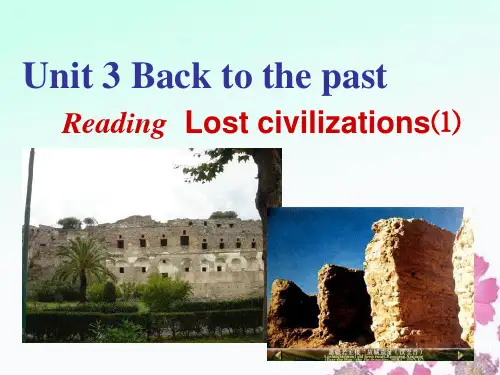
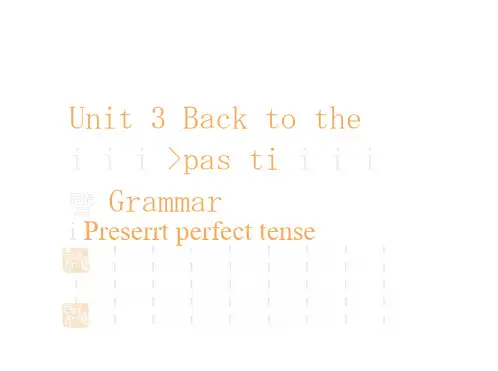
Unit 3 Back to the i i i >pas ti i i i 譬Grammari Preserrt perfect tenseThe uses of the present perfect tense —i lie ui^dppudiuiiue―tn tin (make)Kelly very unhap即少made• We use the present perfect tense to talk about things that happened in the recent past, but are connected to the present.Complete the following sentences with theproper tense.■1 We have studied(study) English for about five years・■2 They have lived(live) in the south since their daughter was born・■3 I have read(read) your article three times・It's well written・■4 The student has finished(finish) her homework al ready.■5 Eric has gone(go) back to his hometowntoday ・■6 The police have just finished(just finish) searchina the area. _____________________ VX Wm ■■ ■ ■ ■ ■w ■ ■ wF W* ■ VX ■■He has just gone out.(=He went out a few minutes ago.)■We use the present perfect tense here to tell others that he isn't here now.■I have just heard the news.(Now I know the news.) We use the present perfect tense to talk about actions that were completed only a short time ago・In this case, just is used・ Pay attention to_ £: JL ; A 厂■ ■ 鼻___________________________________________________________________________________________________________________________________________ tne position OT just.■ We can also use the present perfect tense for repeated actions, that is, we use the present perfect tense with the time expressions once/twice/three times..・■ Look at the following sentences and point out what tense or tenses are used in them and the reasons why they are used.The present perfect tense and the past simple tense■ Read the diary entry and then complete it using the correct forms of the verbs in brackets.■ (2) saw (3) has visited (4) loves (5) hasn't visited (6) has swum (7) has never met (8) has dived (9) has found (10) hasn't found (11) Has, been■ Go over Points 1 and 2 on page 9.■ We form the present perfect continuous tense with have/has been and the present participle of the verb・■Answers: (2) have been talking (3) have been taking (4) have been watching■(5) have seen (6) have been writing■ Present perfect or presentperfect continuous tense?■Li Jia has read a book about Stonehenge ・■Li Jia has been reading a book about Stonehenge.how many times/how longA state verb or an action verb■I've never visited Paris.・Lve already been to Paris・■always, never, yet, already and ever can't be used in a continuous tense.■Sample answers■B 1 He has been waiting at an underground station.■2 They have been traveling in an UFO. It looks like a saucer.■3 They probably have talked to animals or plants on the earth as well as creatures on other plants・■4 They have visited Mars,Venus, Jupiter and some other planets.■How long have you learnt English? Or■How long have you been learning English?■It has snowed for a long time・■It has been snowing for a long time・Both present perfect tenseand present perfectcontinuous tense■ An action which began in the past and is still continuing or has only just finished can, with certain verbs, be expressed by either the present perfect or present perfect continuous.Verbs which can be used in this way include expect, hope, learn, lie, live, sleep, sit, study, wait, want, rain, etc.■Homework■Part C1 and C2 on page 88 in Workbook ■Prepare Task。
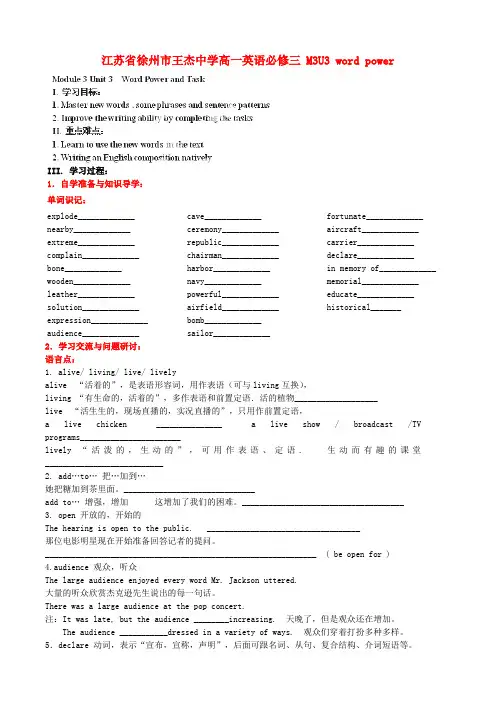
江苏省徐州市王杰中学高一英语必修三M3U3 word powerIII. 学习过程:1.自学准备与知识导学:单词识记:explode_____________ nearby_____________ extreme_____________ complain_____________ bone_____________ wooden_____________ leather_____________ solution_____________ expression_____________ audience_____________ cave_____________ceremony_____________republic_____________chairman_____________harbor_____________navy_____________powerful_____________airfield_____________bomb_____________sailor_____________fortunate_____________aircraft_____________carrier_____________declare_____________in memory of_____________memorial_____________educate_____________historical_______2.学习交流与问题研讨:语言点:1. alive/ living/ live/ livelyalive “活着的”,是表语形容词,用作表语(可与living互换),living “有生命的,活着的”,多作表语和前置定语.活的植物___________________live “活生生的,现场直播的,实况直播的”,只用作前置定语,a live chicken _______________ a live show / broadcast /TV programs_______________________lively “活泼的,生动的”,可用作表语、定语. 生动而有趣的课堂___________________________2. add…to… 把…加到…她把糖加到茶里面。
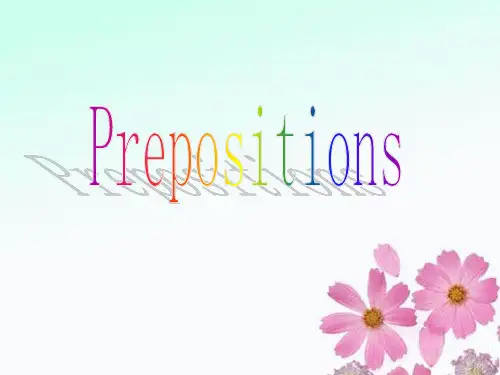
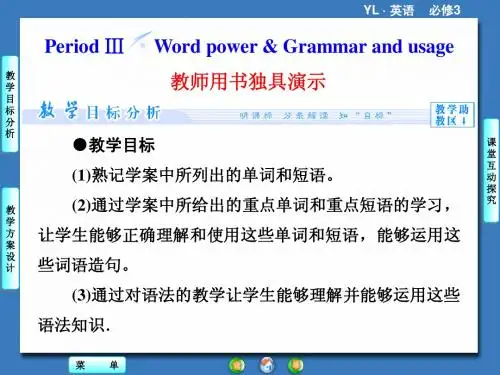
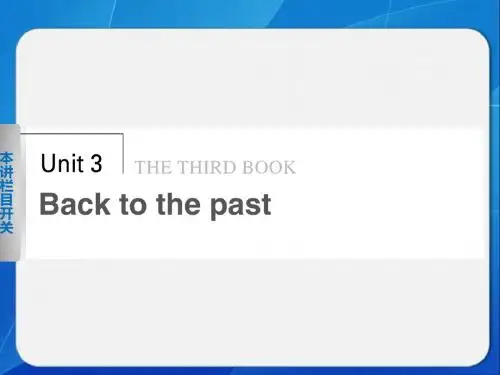
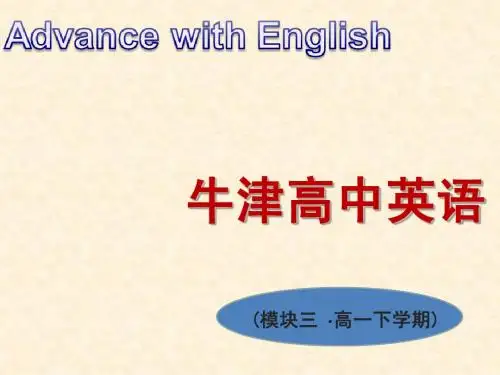
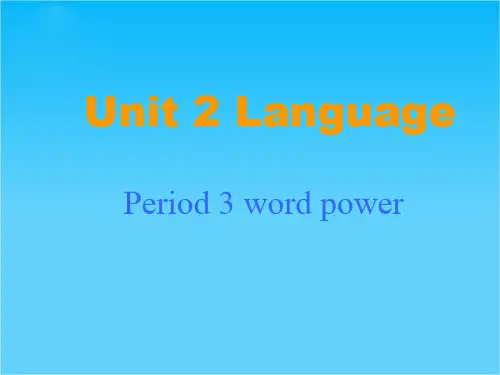
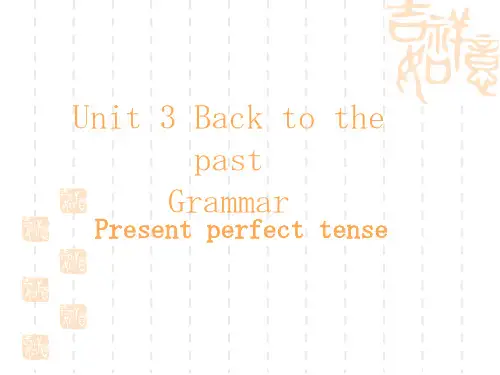
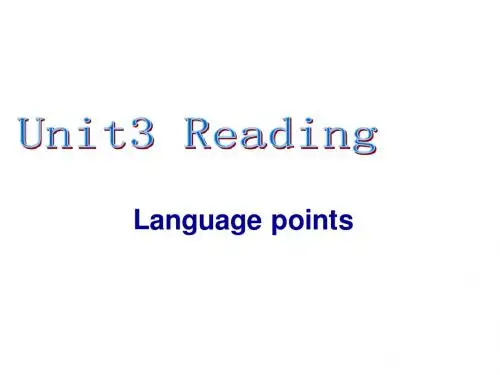
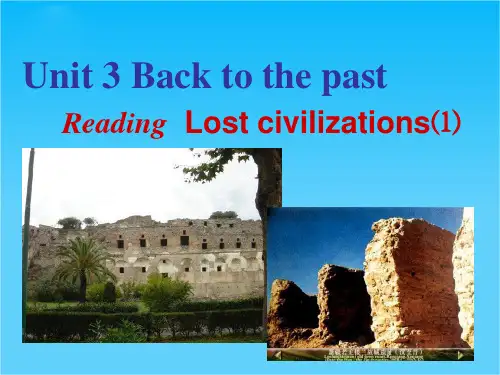
单元:Unit 1 The world of our senses 板块:Reading (1)课时:1课时主备人:审核:年级:高一年级Teaching aims:1.Improve students’ reading ability.2.Enable students to master reading strategy of this kind of reading material.3.Retell a story with a surprise ending.Teaching proceduresStep1: Lead-in (ppt4-6)Ask students to talk about the climate or the weather in the place where they live:1. Do we sometimes have foggy days here? When?2. How do you feel on a foggy day?3. What can you think of when th e word “fog” is mentioned? (Brainstorming)4. Have you ever lost your way in the fog? What would you do if you got lost in thefog?5. Which city has the name of “foggy city”?Step 2: Reading Strategy (ppt7)1. Guide students to read the Reading strategy for the article and teach them theelements of a story.Step 3: First-reading (ppt8-10)1. Ask students to go through the passage as quickly as they can and try to find theelements according to the reading strategy.2. Ask students to find answers to the three questions in part A.3. Ask students to finish D.Step 4: Listening & Second reading (ppt 11-15)1.Listening to the text and read together with it.2.Questions and answers.3.Put these events in the correct order.Step 5: Deep understanding (ppt 16-17)Ask students to read the story again, and try to further understand the text.Step 6: Post-reading activities (ppt 18-22)1. Retell the story Fog with the help of the following chart.2. Discussion:1)What is the personality(性格特点) of the old man?2)What can we do to help those disabled like the old blind man?3. Role play: Suppose you are the editor of a newspaper, try to interview Polly toknow more about what happened to her.Step 7: Assignments (ppt 23)1. Write an interview between an editor and Polly.2. Read the article in Part B in Reading on Page 95 of the workbook.。